
Soil Systems
Scope & Guideline
Innovating Soil Research for Global Sustainability
Introduction
Aims and Scopes
- Soil Health and Quality Assessment:
Research focused on evaluating soil quality indicators, microbial communities, and biochemical properties to understand soil health and its implications for sustainable agriculture. - Soil Management Practices:
Studies on various land use practices, including conservation agriculture, tillage systems, and organic amendments, to improve soil fertility and ecosystem services. - Impact of Environmental Changes on Soils:
Research examining how climate change, pollution, and land use changes affect soil properties, carbon dynamics, and microbial communities. - Soil Remediation and Contamination:
Investigation into methods for remediating contaminated soils, including the use of biochar, phytoremediation, and microbial treatments. - Soil-Ecosystem Interactions:
Exploration of the relationships between soil properties, plant growth, and ecosystem functions, including nutrient cycling and biodiversity. - Innovative Soil Technologies:
Development and assessment of new technologies and methodologies for soil analysis, monitoring, and management, including remote sensing and machine learning applications.
Trending and Emerging
- Climate Resilience and Adaptation:
A surge in research focused on understanding how soils can be managed to enhance resilience against climate change impacts, such as drought and salinity. - Microbial Ecology and Soil Health:
Increased attention on the role of soil microorganisms in maintaining soil health, nutrient cycling, and plant interactions, highlighting the importance of microbial diversity. - Soil Carbon Sequestration:
Growing interest in strategies for enhancing soil organic carbon storage as a means of climate mitigation and improving soil fertility. - Use of Biochar and Organic Amendments:
Emerging research on the application of biochar and other organic amendments for improving soil properties, fertility, and remediation of contaminated soils. - Precision Agriculture and Digital Soil Mapping:
The integration of advanced technologies such as remote sensing, machine learning, and digital mapping techniques to optimize soil management practices and enhance decision-making. - Soil and Water Conservation Techniques:
An increasing focus on practices that promote soil conservation and sustainable water management in agriculture, particularly in the context of water scarcity and soil degradation.
Declining or Waning
- Traditional Soil Fertility Studies:
Research specifically centered on conventional soil fertility practices has decreased as more innovative and integrated approaches gain attention, such as agroecological methods and sustainable intensification. - Single-Factor Analysis of Soil Properties:
There is a waning interest in studies that focus solely on single-factor analyses (e.g., one nutrient or soil property) without considering the complex interactions within soil systems. - Historical Soil Studies:
Research that primarily investigates historical soil data without applying modern analytical techniques or addressing contemporary issues such as climate change impacts is becoming less prevalent. - Soil Physics in Isolation:
Studies focusing solely on soil physical properties without integrating biological or chemical aspects are declining as the field moves towards a more holistic understanding of soil systems.
Similar Journals

SOIL SCIENCE SOCIETY OF AMERICA JOURNAL
Elevating Soil Science to New HeightsWelcome to the SOIL SCIENCE SOCIETY OF AMERICA JOURNAL, a premier publication in the field of soil science, published by WILEY. With a distinguished history dating back to 1976, this journal has consistently provided a platform for researchers to share innovative findings and insights into soil’s critical role in agricultural and ecological systems. Featuring an impressive Q1 category ranking in Soil Science and positioned within the top 25% of its field according to Scopus, this journal is recognized for its impactful contributions to advancing our understanding of soil dynamics. While not an open-access journal, it remains a valuable resource for academics and professionals alike, with distinguished articles that meet the highest scientific standards. As it enters its converged years from 1976 to 2024, the journal aims to continue shaping the future of soil research, offering valuable knowledge to students, researchers, and practitioners dedicated to sustainable land management and environmental preservation.
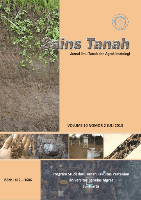
SAINS TANAH
Connecting Local Insights with Global Environmental ChallengesSAINS TANAH is a renowned peer-reviewed journal that focuses on the fields of agronomy, soil science, and environmental studies, published by Universitas Sebelas Maret Surakarta in Indonesia. Established as an Open Access platform since 2001, it aims to disseminate high-quality research that addresses critical issues in soil health, crop management, and pollution, thereby fostering sustainable agricultural practices. With its current impact factor demonstrating a Category Quartile ranking of Q3 and Q4 in major areas such as Agronomy and Crop Science, Atmospheric Science, and Pollution, SAINS TANAH serves as an essential resource for researchers, professionals, and students dedicated to advancing knowledge and solutions in these vital fields. By providing a collaborative environment and upholding rigorous academic standards, the journal not only highlights the significance of Indonesian research contributions but also aims to connect local insights with global agricultural and environmental challenges.
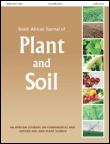
South African Journal of Plant and Soil
Exploring the intersection of ecology and agriculture.South African Journal of Plant and Soil is an esteemed academic publication dedicated to advancing the fields of Ecology, Plant Science, and Soil Science. Published by TAYLOR & FRANCIS LTD in the United Kingdom, this journal has been a vital resource since its inception in 1984, providing a platform for innovative research and scholarly articles that address critical issues in plant and soil management. With a current impact factor placing it in the Q3 category according to the 2023 rankings, it occupies an influential position within the academic community, especially amongst researchers focused on agricultural and environmental sciences. Although not an open-access journal, it remains accessible to a broad audience through libraries and institutions that recognize its value in facilitating ecologically and environmentally focused discussions. The journal's ongoing commitment to publishing high-quality research ensures that it plays a pivotal role in nurturing knowledge and fostering advancements in sustainable practices across southern Africa and beyond.

Spanish Journal of Soil Science
Advancing Soil Science for a Sustainable FutureThe Spanish Journal of Soil Science is a prestigious open-access journal published by FRONTIERS MEDIA SA since 2011. Based in Switzerland, this journal serves as a vital platform for disseminating innovative research and applications within the field of soil science. With its commitment to accessibility, the journal enables researchers, professionals, and students from around the globe to contribute to and benefit from its wealth of knowledge. As of 2023, it holds a respectable Q3 category ranking in soil science and is positioned at #88 out of 159 in the Scopus rankings for Agricultural and Biological Sciences. The journal aspires to foster collaboration and communication among soil scientists, encouraging the exploration of contemporary soil issues, sustainable practices, and advancements in technology. Its open-access model ensures that the latest findings are freely available, promoting a broader impact in environmental and ecological studies.

Journal of Soil Science and Plant Nutrition
Pioneering insights in soil science and plant nutrition.The Journal of Soil Science and Plant Nutrition, published by SPRINGER INT PUBL AG, is a premier academic journal dedicated to advancing the fields of agronomy, plant science, and soil science. With an impressive Q1 ranking in both Agronomy and Crop Science and Plant Science, alongside a Q2 ranking in Soil Science, this journal stands at the forefront of innovative research and knowledge dissemination. Annually indexed in key databases, it provides a platform for high-quality research articles that explore the complex interactions between soil health and plant nutrition, contributing significantly to sustainable agricultural practices. Although it does not offer open access options, the journal is accessible through various academic institutions and libraries, ensuring a wide readership. With its emphasis on impactful findings, the journal is an essential resource for researchers, professionals, and students aiming to further their understanding and application of soil and plant science in an ever-evolving global context.
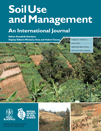
SOIL USE AND MANAGEMENT
Uncovering insights for a sustainable agricultural landscape.SOIL USE AND MANAGEMENT is a premier academic journal published by Wiley, focusing on the critical domains of Agronomy, Crop Science, Pollution, and Soil Science. With an ISSN of 0266-0032 and an E-ISSN of 1475-2743, the journal has established itself as a vital resource in the field since its inception in 1985. Operating from its U.S. headquarters in Hoboken, NJ, SOIL USE AND MANAGEMENT boasts impressive Q1 rankings across its relevant categories, indicating its standing in the top tier of research journals. Notably, it is ranked 48th out of 406 journals in Agronomy and Crop Science and holds an 88th percentile position, as well as a commendable rank of 26th out of 159 journals in Soil Science, underscoring its influence and reach. This journal serves as an essential platform for researchers, professionals, and students dedicated to sustainable soil management practices and understanding soil's role in agricultural productivity and environmental health. Although it does not offer Open Access, its rigorous peer-review process ensures the publication of high-quality original research, reviews, and case studies critical for advancing knowledge and practice in the field. This journal is crucial for anyone engaged in soil science and its related disciplines, encouraging innovative approaches to challenges facing soil use and management today.
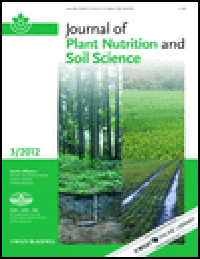
JOURNAL OF PLANT NUTRITION AND SOIL SCIENCE
Fostering knowledge for a greener, more sustainable future.JOURNAL OF PLANT NUTRITION AND SOIL SCIENCE, published by WILEY-V C H VERLAG GMBH, stands as a premier platform in the field of agricultural and biological sciences, focusing specifically on the intricacies of plant nutrition and soil science. With an impressive impact factor and a respected Q1 category ranking in Plant Science and Q2 category ranking in Soil Science for 2023, this journal is essential for researchers and professionals seeking to advance their understanding and foster innovative practices in sustainable agriculture. The journal’s open access options ensure a broad dissemination of knowledge, appealing to a global audience and facilitating collaborative research efforts. Embracing a broad scope that extends from foundational science to cutting-edge research developments in soil health and nutrient management, the journal serves as a critical resource for both emerging scholars and established experts, reinforcing its pivotal role in addressing the challenges of food security and environmental sustainability. With years of convergence from 1996 to 2024, it remains committed to excellence in scholarly communication, providing a vital forum for the sharing of valuable insights and advancements in the field.

Soil Science Annual
Cultivating innovative research in soil science.Soil Science Annual, published by Polskie Towarzystwo Gleboznawc, is an esteemed open-access journal dedicated to advancing the field of soil science and related disciplines. With its ISSN 2300-4967 and E-ISSN 2300-4975, this journal has been pivotal since its inception in 2012, providing a vital platform for researchers, professionals, and students to share innovative findings and insights. The 2023 Scopus rankings place the journal in Q2 for Earth and Planetary Sciences (miscellaneous), and Q3 for both Environmental Science (miscellaneous) and Soil Science, underscoring its influence and contribution to these fields. Housed in Warsaw, Poland, the journal fosters scholarly dialogue and dissemination of research findings critical to understanding soil mechanics, conservation practices, and sustainable land use. With its open-access model, Soil Science Annual ensures that research is accessible to a broad audience, encouraging collaboration and innovation in tackling global environmental challenges.

Frontiers in Soil Science
Unlocking the secrets beneath our feet.Frontiers in Soil Science, published by FRONTIERS MEDIA SA in Switzerland, is an esteemed open-access journal dedicated to advancing our understanding of soil systems and their vital role in ecosystem functioning and sustainable agricultural practices. Since its inception in 2021, this journal has quickly established itself within the scientific community, boasting a 2023 Scopus Q2 ranking in Soil Science and a notable percentile of 41 among its peers. Researchers and practitioners in the field will find a wide array of original research, reviews, and contributions that address key topics such as soil health, carbon sequestration, and nutrient cycling. With a commitment to fostering collaboration and dissemination of knowledge, Frontiers in Soil Science serves as a vital resource for professionals, researchers, and students who aspire to innovate and lead in soil science research.
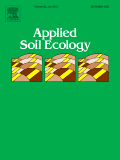
APPLIED SOIL ECOLOGY
Connecting Science to Soil HealthApplied Soil Ecology, published by Elsevier, is a premier journal dedicated to advancing the field of soil ecology through rigorous research and innovative methodologies. With an impressive impact factor and a consistent placement in the Q1 quartile across various categories including Agricultural and Biological Sciences, Ecology, and Soil Science, this journal underscores its significance in the scientific community. The journal's scope encompasses critical areas such as soil biology, microbial ecology, and the role of soils in ecosystem services, aiming to foster collaboration and knowledge exchange among researchers, professionals, and students. The convergence of research efforts from 1994 to 2024 highlights its commitment to maintaining current and relevant discourse within the field. While open access options are not available, the quality and depth of the articles published ensure that the latest findings and discussions are accessible through institutional subscriptions. With a strong focus on empirical studies and applied research, Applied Soil Ecology is an essential resource for anyone interested in the complexities of soil ecosystems and their impact on the environment.